June 20, 2025 | 22:26 GMT +7
June 20, 2025 | 22:26 GMT +7
Hotline: 0913.378.918
June 20, 2025 | 22:26 GMT +7
Hotline: 0913.378.918
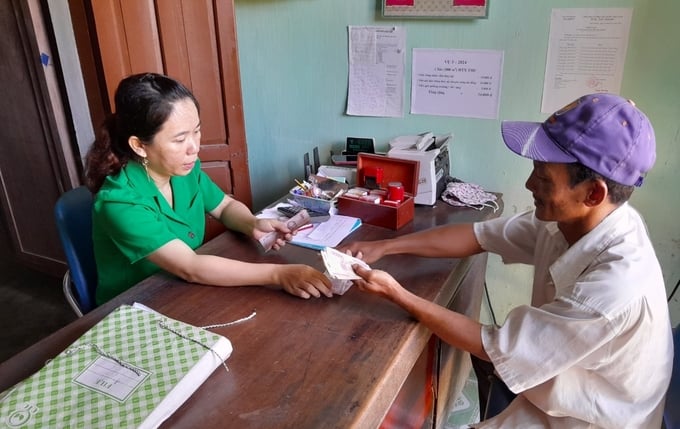
Members of Hoa Phong Cooperative applying for internal loans. Photo: KS.
We arrived at Hoa Phong Agricultural Service Cooperative, located in Hoa Phong Commune, Tay Hoa District, Phu Yen Province, while Director Nguyen Van Dong was busy reviewing internal loan services for the cooperative members. This service is growing increasingly rare among local cooperatives, with the few maintaining such programs typically providing smaller loan amounts due to the challenges of fund recovery.
According to Director Dong, the cooperative allocates nearly 5 billion VND every year for internal loans to assist members in investing in agricultural production, developing diverse professions, meeting labor needs, providing stable employment, and increasing household income.
The cooperative has maintained this service since its inception in 1995. Each year, approximately 400 to 500 cooperative members apply for an internal loan with a 12-month repayment period and interest rates comparable to those of agricultural banks. Starting from July 1, 2024, the interest rate will be adjusted to 0.75% per month to match that of social policy banks. Hoa Phong Cooperative disbursed approximately 4.4 billion VND in internal loans in 2023.
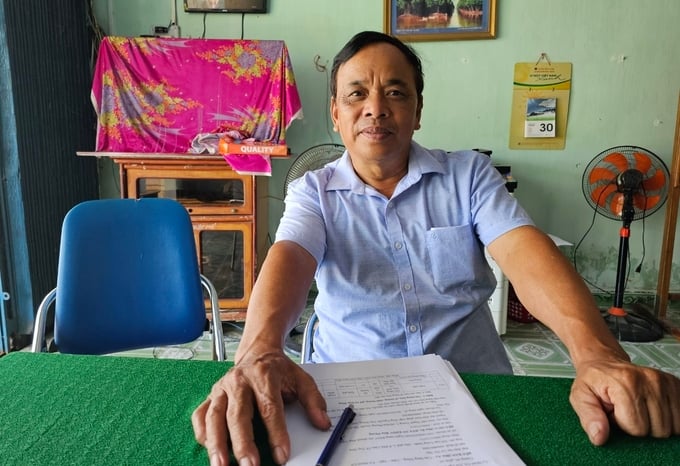
Nguyen Van Dong, Director of Hoa Phong Cooperative. Photo: KS.
According to Farmer Nguyen Van Thanh, a cooperative member from My Thanh Trung 2 Village, Hoa Phong Cooperative has maintained a dedicated support role for its members. Notably, farmers in need of capital can easily obtain loans with minimal paperwork, with the only requirement being an agricultural land certificate. With a maximum loan amount of 20 million VND, the cooperative has enabled its members to purchase additional cattle, feed for livestock, and overcome financial difficulties.
Rice is the primary crop at Hoa Phong Cooperative, with a total production area covering 577 hectares. According to Director Dong, with the aim of assisting members in reducing input costs and increasing productivity and quality, the cooperative provides five comprehensive service solutions, including land preparation, seed provision, fertilization, pest control, internal irrigation, and harvesting.
Consequently, the commune boasts a mechanical land preparation coverage of over 90% of the total acreage for each crop, enabling the cooperative members to follow an established farming schedule. Additionally, local farmers utilize certified seeds on over 85% of the total rice production area. The cooperative is currently managing more than 64 kilometers of irrigation channels, with a team of 24 irrigation staff who regularly monitor and manage water distribution for 577 hectares of production land, which supports two rice crops per year.
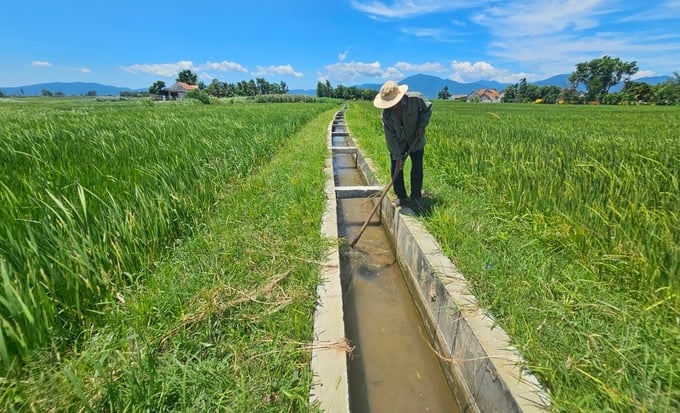
Hoa Phong Cooperative employs an irrigation team to maintain a stable supply of water for rice production. Photo: KS.
Regarding fertilizer and plant protection products, Director Dong stated that the commune has established local distributors in various villages. The cooperative advances the costs of these supplies to its members, who pay at the end of each harvest season. The cooperative is responsible for the quality and quantity of the agricultural supplies. On the other hand, local distributors are tasked with transporting supplies from the warehouse to individual farms, selling them at prices set by the cooperative, and collecting payments to be remitted to the cooperative after the harvest.
"We will pay distributors a commission based on the quantity of supplies sold, with an additional discount of 60,000 VND per ton for sales exceeding 10 tons," Director Dong explained.
Le Chi Tam, a distributor from My Thanh Trung 2 Village, reported that local farmers have expressed satisfaction with the cooperative's advance supply services over the years. As a result, nearly 90% of the local farmers utilize this service, with the credit sale prices increasing by only 8,000 to 10,000 VND per bag of supply, depending on the type. The distributor supplies an average of 40 tons of various products to farmers every year.
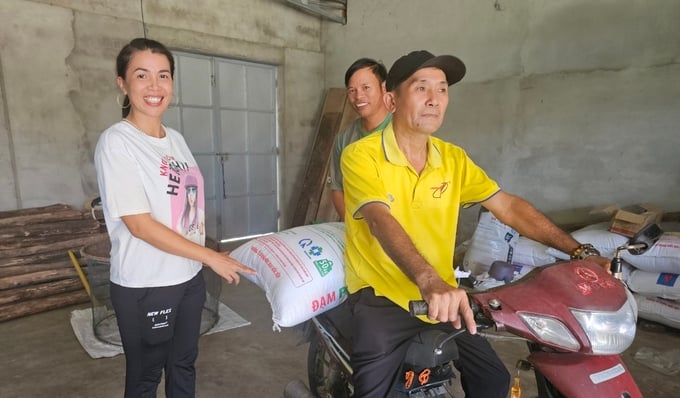
The cooperative provides farmers with supplies in advance, offering to receive payment after harvest. Photo: KS.
Notably, the cooperative also offers agricultural extension services, featuring an agricultural extension club with 70 members. The club holds quarterly meetings to discuss agricultural production and economically efficient models. This solution has enabled cooperative members to adopt integrated pest management (IPM), "one must, five reductions," and "three reductions, three increases" practices, as well as row and broadcasting sowing techniques. These practices help reduce pests, increase yields, and minimize environmental impact.
Mulberry is another key crop in Hoa Phong Commune. The practice of mulberry cultivation and silkworm rearing, which is unique to Phu Yen Province, has been established within the commune for over 30 years. However, recent weather changes and market fluctuations have diminished the profitability of silkworm cocoons, forcing numerous local households to abandon the practice in favor of other crops. In response to this challenge, Hoa Phong Cooperative is committed to reviving sericulture for its members starting in August 2023.
Director Dong added that the cooperative is currently developing a new mulberry variety on 1.1 hectares, with the first harvest of mulberry leaves expected by the end of August 2024. The cooperative has organized field trips for 30 farmers to promote the practice of sericulture. Additionally, four staff members have traveled to Binh Dinh Province to gain insights into effective silkworm farming practices.
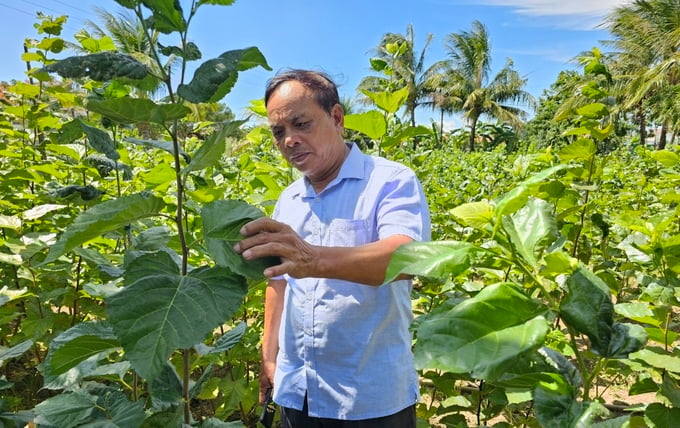
Hoa Phong Cooperative is cultivating a new mulberry variety before replicating on a larger scale among its members. Photo: KS.
“After our trips, we will establish a pilot model at the cooperative to transfer this knowledge to local farmers. This new method yields cocoon production that is twice as high as before. Furthermore, the silkworms are healthier, suffer from fewer diseases, and require less tending, allowing farmers to earn 3 to 4 times more profits than they would from rice cultivation,” Director Dong stated.
Tay Hoa District People's Council recently approved support for the cooperative to invest in a centralized silkworm rearing facility covering 200 square meters, with a budget of 1.2 billion VND. After the new silkworm rearing practice is widely adopted by 2025 or 2026, the cooperative plans to expand the model throughout the commune. Consequently, the cooperative will become self-sufficient in supplying silkworm larvae, and will also manage the procurement and marketing of all products for local farmers.
Hoa Phong Cooperative also offers various services, including retail sales of gasoline, oil, and other products; waste collection fee collection; health insurance; and sales of silkworm liquor and dried silkworms. The cooperative also provides asset rental, liquidation services, and other miscellaneous services. Hoa Phong Cooperative currently has over 2,000 members, with annual revenue ranging from 24 to 25 billion VND. It distributes annual dividends of between 300 and 400 million VND to its members. Accordingly, the cooperative generates a net profit of 600 to 700 million VND per year after expenses.
Translated by Nguyen Hai Long
![Turning wind and rain into action: [10] Advancing accessible climate services for farmers](https://t.ex-cdn.com/nongnghiepmoitruong.vn/608w/files/linhnhp/2025/06/20/1911-z6704423696987_15fd32ffc26d590d204d520c9dac6786-nongnghiep-161854.jpg)
(VAN) Not only does it help farmers 'avoid droughts and rains,' the development of agricultural climate services also enhances their ability to proactively adapt to a rapidly changing climate.

(VAN) With international assistance, the harvesting of sargassum seaweed in Quang Ngai has become increasingly regulated, thereby safeguarding marine life and ensuring the stability of coastal communities' livelihoods.
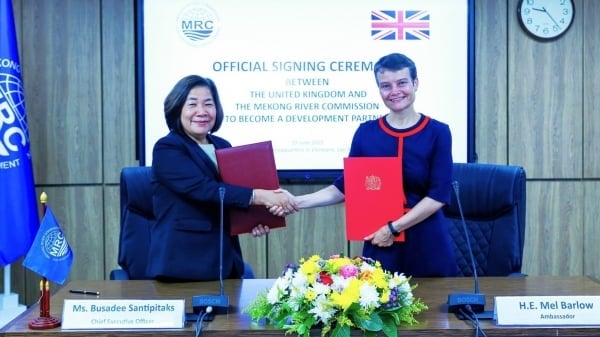
(VAN) On June 19, the United Kingdom officially became a Development Partner of the Mekong River Commission.

(VAN) Biodiversity is being threatened by traditional remedies made from wildlife. Traditional medicine and humans must change to live in harmony with nature.

(VAN) Agrifood investment and finance solutions for people and the planet.

(VAN) Microplastic contamination has become pervasive in seafood, posing unprecedented challenges for food safety and marine ecosystems.
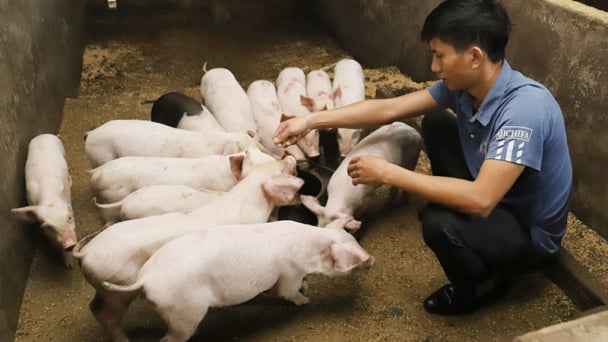
(VAN) Proactively using vaccines, combined with transport control and enhanced surveillance, is the only viable path toward biosecure and sustainable livestock production in Vietnam.